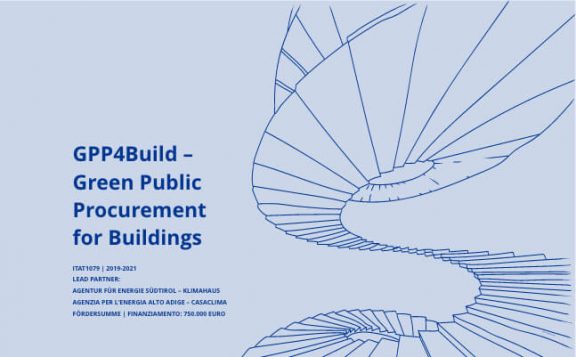GPP4Build – Green Public procurement for Buildings
The project Green Public Procurement for Buildings (GPP4Build), funded by the European Union in the framework of the INTERREG Italy-Austria programme, deals with sustainable public procurement (Green Public Procurement – GPP), with a special focus on the construction sector. Public procurement is one of the most important activities of the public administration (PA) and can have a strong impact on the local economy.
For this reason, EU member states have been invited to develop and implement National Action Plans (NAPs) for their management, with the aim of reducing the environmental impacts associated with them.

Through the eco-assessment of purchasing procedures, the PA has the possibility to “select those products and services that have a low or reduced environmental impact compared to other products and services used for the same purpose”, while facilitating their dissemination outside the public sector.
Despite these positive preconditions, the implementation of the EU directives on Green Public Procurement and the circular economy, especially in the construction sector, is getting off to a slow start.
This is partly due to the fact that In Austria the sustainability criteria are implemented differently at national, regional and even local level, as the existing legal framework allows individual contracting authorities to decide for themselves how to implement these criteria in procurement.
In Italy, on the other hand, the application of GPP is mandatory throughout the national territory through the Minimum Environmental Criteria (MEC) issued by a decree of the Minister of Environment for the Protection of Land and Sea. The reference for the construction sector is the DM decree of 11 October 2017. Nevertheless, even in Italy it is difficult for all stakeholders – public transport, planners and SMEs – to implement the requirements of the decree.
In this scenario, companies suffer from a lack of information and expertise and find it increasingly difficult to reach their target market. In addition, the existing lack of clarity about the legal framework regulating the circular economy and its requirements is perceived as another obstacle to the implementation of these principles. It is clear that the complexity of the issues related to the circular economy requires a systematic approach to avoid possible unfavourable impacts and negative consequences.